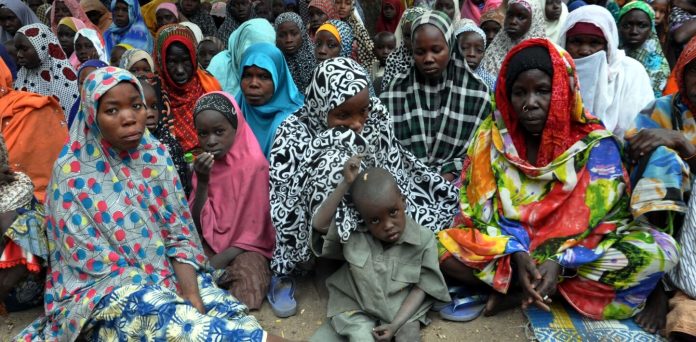More than 10,000 households at risk; Internally Displaced Persons forced to return home despite attacks by armed groups; At least 6 killed and 14 injured during attacks at resettled camps.
Amnesty International is deeply concerned about the safety of thousands of Internally Displaced Persons (IDPs) in Borno state, who are at risk of forced resettlement as the Borno state governor moves to close all IDP camps within Maiduguri by 31 December 2021, despite continued attacks by Boko Haram and ISWAP and human rights violations by the military.
In a public statement released today, which is based on 38 interviews with former IDP returnees and individuals currently living in IDP camps within Maiduguri, survivors informed Amnesty International that they fear for their lives as they are being forced to leave the IDP camps with short notice and many are coerced to remain in resettled areas despite escalating attacks.
“The conflict that made us flee our homes out of fear, is what the government is forcing us to go back and face. We fear the attacks may happen again. I am so scared of going back home after what I faced at the hands of Boko Haram and while in detention in Giwa Barracks. I was arrested by the military for not escaping from our village on time; what if it happens a second time?” – 28-year-old housewife formerly living in Bakassi IDP camp.
“Returning displaced persons forcibly to villages that are not safe would be in violation of the Nigerian government’s responsibility of protecting the right to life of civilians. Most displaced persons barely escaped from Boko Haram’s campaign of killings, abductions, looting and torture, or from the attacks, extrajudicial killings or torture in unlawful detention by the Nigerian military. They have endured years of gross human rights violations and abuses, including war crimes by the military and armed groups.” – Osai Ojigho, Country Director, Amnesty International Nigeria.
At least 6 people were killed and 14 injured in Agiri, Mafa Local Government Area on 30 August 2021, one month after they were resettled. Returnees in New Marte, Agiri and Shuwari have experienced multiple attacks by Boko Haram since their resettlement.
“It is absolutely shocking that people who already suffered so much in the conflict between Boko Haram and the Nigerian military would further be exposed to horrendous possible violations and abuses, instead of receiving protection from the authorities,” says Osai Ojigho, Country Director, Amnesty International Nigeria.
Most of the resettled IDPs that Amnesty spoke to, have little or no access to essential services like drinking water, healthcare, sanitation and live in extreme poverty. Inadequate housing and lack of job opportunities in resettled villages have further compounded their sufferings. At least 41 people died in early October 2021 during a cholera outbreak in the resettled camp in Shuwari, Jere local government area while 20 older people and 21 children were killed by the disease.
More than 10,000 households still living in Internally Displaced People’s (IDP) camps within Maiduguri are at risk of forced resettlement by 31 December 2021 as the Borno state government plans to continue their resettlement programme at all cost.
Amnesty International is calling on the Borno state government to abide by their obligations to IDPs under international law, and ensure all resettled individuals and people living in IDP camps have access to adequate housing, food, water, sanitation and healthcare. The government should also ensure that all children are able to continue their education.
Multiple attacks at resettled camps
A woman whose 12-year-old daughter was shot when the armed group Boko Haram attacked their resettled shelter in Agiri, Mafa LGA informed Amnesty International that: “Four days after we arrived Agirimafa, we were attacked by Boko Haram. The military ran away during the attack and our husbands and other men also ran. Boko Haram announced during the attack that we should stay here that they would not touch us but after one month, they came again around 12am in the night. They opened fire on us. My daughter was shot on her leg three times. After the attack, we had to wait till morning before we took her to the hospital. We stayed in the hospital for 80 days and they conducted several surgeries on her but at the end she became paralyzed.”
Former IDP’s resettled in New Marte in January 2021 have also witnessed multiple attacks. Witnesses told Amnesty International that they spent two days trekking to Dikwa after they were attacked few weeks after their return.
“Few weeks after we arrived, Boko Haram attacked Marte and the military ran and left us. The attack lasted till the next day but they said they won’t disturb us and that we can stay to continue with our farming. After they left, I told my husband that we need to leave here. You can’t trust an insurgent even though they said they were not going to touch us. An insurgent would always change his mind.” – 30-year-old woman and mother of six children from New Marte, Marte LGA.
After the attack, all the returnees left New Marte to Maiduguri, leaving behind two older people who were too ill and old to travel with them. During the journey, 4 older people died of thirst and fatigue but on getting to Dikwa, they were refused passage to Maiduguri by the military officers in charge. The military made them stay in Dikwa for 25 days before taking them back to New Marte.
Forced resettlement amid short notice
All resettled IDPs interviewed in Agiri and Shuwari villages informed Amnesty International that they were forced to leave the camp on short notice. People were not allowed to share their concerns with the governor or government officials who came to tell them about the resettlement plan.
“A ward head argued that the authorities must give the IDPs time to consult among themselves, but he was asked to keep quiet and obey the instructions given to him.” – A 55-year-old woman and mother of six children.
According to a 30-year-old farmer resettled at Agiri, Mafa LGA: “The Chairman of Mafa LGA gathered us and said we are being given three days’ notice to vacate the IDP camp. He said that on Monday and Tuesday, people in Agiri will be returned, while others in surrounding villages will be returned on Wednesday. He said we must prepare ourselves and return to our villages. Everyone was confused with the three days’ notice and we were returned to Agiri on the expiration of the short notice.”
A 55-year-old woman and mother of six who was forced to resettle at Agiri, Mafa LGA, after living in Muna IDP camp for the past 6 years informed Amnesty International that they had no clue that government planned to resettle them as there was no prior information.
“When I heard we will be going back, I was so scared. I didn’t want to go because I knew the place was not safe. We have been hearing about the attacks, but they forced us to return.”
“Taking people back in a rush is not good. People should be consulted and those who are happy to go and start farming should be allowed to go. Others who are not willing should not be forced. Forcing people to leave is a risk. My son was shot in the leg during the second attack because of this,” said a 36-year-old man and father of six whose 4-year-old son was shot on 30 August 2021.
Returning displaced persons forcibly to villages that are not safe would be in violation of the Nigerian government’s responsibility of protecting the right to life of civilians
“Boko Haram did so many bad things to us, but I would never forget how I felt the day government officials came to the IDP camp on a Wednesday and informed us that by Friday at 4pm, they don’t want to see anyone in the IDP camp. We were given two days’ notice and I didn’t know where to go with my seven kids,” says 28-year-old father of seven now living in Shewari camp, Jere LGA.
Inadequate housing
Inadequate housing and lack of job opportunities have further compounded the sufferings of the returnees. Thousands are facing secondary displacements without humanitarian aid. The housing provided by government is grossly inadequate and not distributed fairly: “When we got to Shuwari, I was surprised to find out that there were no houses for us in spite of the governor’s promises. From the 10,000 naira left out of the 20,000 naira the governor gave us, I bought wood and constructed a makeshift homefor my family,” says a 28-year-old father of 7 formerly living in Farm Center IDP camp but resettled at Shewari, Jere LGA.
The two-bedroom housing built by the government was given to the resettled original inhabitants of the villages whose houses were affected by the insurgency while returnees from other villages face secondary displacement as they are forced to stay in tents or build thatch houses.
A 40-year-old woman with seven children who lived in Farm center IDP camp for 7 years before being forcibly resettled at Shuwari, Jere LGA informed Amnesty International: “When we arrived at Shuwari they left us by the side of the road. We slept there and, in the morning, we cooked the little food we had with us. Some government officials now came and asked us to go to the back of the village and that the government got a space for us where we could build our tents.”
Access to water, sanitation and healthcare
Resettled IDPs told Amnesty International that they have little access to essential services such as drinking water, sanitation and healthcare. In Agiri, Mafa LGA, IDPs told Amnesty International that there are no operational healthcare services.
A woman whose 4-year-old son was shot when Boko Haram attacked the resettled shelter informed Amnesty International that: “They built a hospital, but it has not started operating. If someone falls sick in Agiri, we take them to Mafa LGA. It is a 9km, 30 minutes’ drive from Agiri to Mafa, but cars are not always available. There are always cars in the morning before 2:00pm, but after 2:00pm you won’t get a car to Mafa.”
People also have to travel long distances or wait for hours before they can get clean water which they have to pay for. People resettled in Agiri and Mafa depend on one borehole per village for water.
“Water is the most difficult thing for us as we have only one borehole. If you go to fetch water, you will find over four or five hundred women at the borehole. If we want to perform other domestic chores like washing, we have to go to the river for that. But the water at the river is now dried because of the season. If you go to get water early in the morning, you will only come back after 2 or 3pm because of the crowd. Some people even go as far as Mafa LGA to get water,” said a 55-year-old woman and mother of six.
In Shuwari, Jere LGA, many children and older people who were forcibly resettled suffered during the cholera outbreak in early October. At least 20 older persons and 21 children died during the cholera outbreak.
“They built 12 temporary toilet structures for us, but we are more than a thousand people. When the rain came, water flushed the toilets away,” said a 42-year-old woman and mother of four.
Food shortage
Returned IDP’s in Agiri and Shuwari face acute food shortages after being cut off from humanitarian aid for more than 4 months after their forced resettlement. Before leaving the IDP camps, government promised to give each head of households N100,000 (242 USD) for foodstuff once they are resettled. Each man and woman head of household received N20,000 (48 USD) at the camps with the understanding that the balance will be given to them once they resettled: “We are suffering, especially the older people in our midst. You can literally see the pains and hunger in them, but there is nothing you can do. In Shuwari, the older people are really suffering. While the governor promised to give us the remaining N80,000 (194 USD) once we arrived in the resettled area, we are yet to receive anything from him.”
A 55-year-old widow and mother of six in Agiri, Mafa LGA informed Amnesty International that the last support they got was 4 months ago: “Four days after Boko Haram attacked us and many people were contemplating going back to the IDP camps, they brought food for us in order to placate us. This was ten days after arriving Agiri.”
On 6 December, the Borno state governor banned all humanitarian organizations from distributing food and non-food items to newly resettled communities across the state, but he has failed to adequately provide the needed support to the people.
Most of the people resettled in host communities don’t have farms and have to beg the original inhabitants of the villages for portions of lands to farm. The returnees face food shortage which may last for months if help is not provided before the next farming season July next year.
“Where we are resettled is different from our village. They brought us to a place where we don’t have farms. You have to go farm for somebody before you are able to feed your family. You can’t even do business; we are always idle.” – A 35-year-old former trader at Muna IDP camp.
Amnesty International found that majority of people whose homes were in other villages and are now resettled in Agiri and Shuwari are in urgent need of food support. Several of them in resettled villages complained of not having access to farms. Resettled and registered residents living in the 2-bedroom housing built by the government have been provided with monthly food support since their resettlement in July 2021 but others who were not originally from the Agiri and Shuwari are denied access to this support.
“We call on the Borno state governor to immediately meet the urgent needs of resettled individuals in Agiri, Shuwari and other resettled communities. The authorities must do more to ensure that the human rights of those displaced are met.” – Osai Ojigho, Country Director Amnesty International Nigeria.
Under international humanitarian law, Nigerian authorities can only order the displacement of a civilian population if the security of the civilians involved or imperative military reasons so demand.
As civilians’ lives are being put at greater risk by the displacement of IDPs in Borno state from IDP camps to their ancestral homes, these forced displacements likely constitute war crimes, and may constitute the crime against humanity of forcible transfer.
The 2012 national policy on IDPs in Nigeria recognizes the IDPs’ right ‘to be protected against forcible return to or resettlement in any place where their life, safety, liberty and/or health would be at risk.’ They also have a right to ‘decide if they want to return to their homes or places of habitual residence.’
In August 2021, the federal government approved a new national policy for IDPs in Nigeria. The new policy is aimed at strengthening the institutional mechanism and frameworks for the realization of the rights, dignity and wellbeing of IDPs. The new policy has however not positively impacted on the lived realities of IDPs.
Distributed by APO Group on behalf of Amnesty International.






